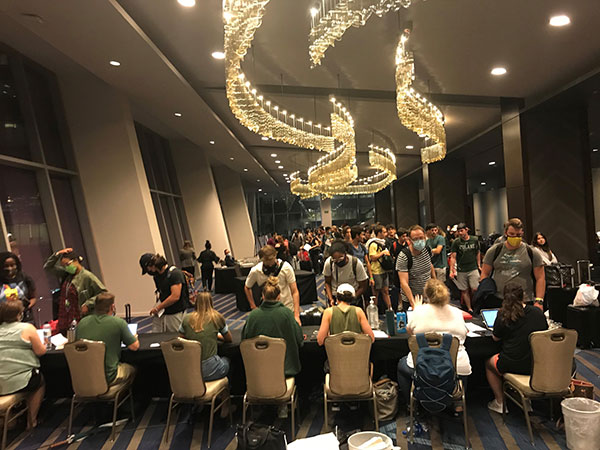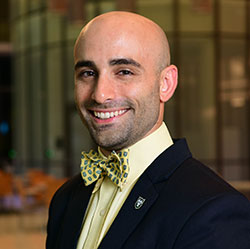
Volunteers check students into the Houston Marriott Marquis Hotel following their arrival from New Orleans in the wake of Hurricane Ida.
On Aug. 31, 2021, Tulane students began pouring into the Marriott Marquis and Hyatt hotels in Houston after an eight-hour bus ride from New Orleans. They were the first arrivals of what would eventually be more than 2,500 students evacuating in the wake of Hurricane Ida.
Following the catastrophic storm, which damaged roofs, toppled trees and destroyed the city’s power grid, Tulane President Mike Fitts announced that the university’s campus was shutting down for six weeks to enable power to be restored and repairs made to campus facilities. Residential students, who had sheltered in place during the storm, would be transported by bus to hotels in Houston where they could make arrangements to continue their journeys home.
The announcement triggered a monumental logistical effort on the part of university staff members, who within hours had to secure dozens of buses to transport the students to Houston and hundreds of hotel rooms to house them.
Evan Nicoll (BSM ’12, MBA ’16), a senior development officer at the Freeman School, had evacuated to Houston with his wife prior to Ida’s landfall. When he heard that the students were headed to Houston, he immediately reached out to university officials to see if he could help.

Evan Nicoll (BSM ’12, MBA ’16) helped lead volunteer efforts in Houston to accommodate more than 2,500 Tulane students who were evacuated from New Orleans following Hurricane Ida.
“I sent a text to [Tulane Associate Vice President of Student Affairs] Erica Woodley and said, ‘I’m here. What do you need?’” Nicoll recalls. “She said, ‘Meet me at the Hyatt tomorrow at 1 o’clock and bring as many people as you can.’”
Nicoll started calling everyone he knew in Houston — friends, former classmates, alumni he’d worked with through his role in development. He and the Tulane Club of Houston eventually rounded up about 30 volunteers to greet the wave of arriving students and get them to where they had to be.
“We needed to divide them into three buckets,” Nicoll says. “First, there were some students who were going to be getting on flights that day, like within hours of arriving, so we had to find out who those students were and put them in Ubers for the airport. Then, we had to determine which students were staying for the short term — like a week or less — and which students were staying long term. Depending on which group they were in, we had to send them to different hotels.”
Nicoll and the team of volunteers put in long days and nights, checking in students, answering questions, helping them make connections and generally ensuring they had everything they needed. Houston alumni and parents also played a huge role in the effort. The Houston Alumni Club set up a hospitality suite for arriving students with snacks and toiletries and later organized a watch party for the Tulane – Oklahoma football game on Sept. 4.
“The outpouring of support was just amazing,” Nicoll says. “People were willing to lend a hand wherever it was needed, and I met a ton of people who made not only in-kind contributions of things that students needed but also cash donations to the Hurricane Relief Fund for students. It was just wonderful to see all the support for our students.”
Most of the students headed home within days, but several hundred — many of them international students who couldn’t easily travel home — remained in Houston until they could return to campus. Nicoll said the volunteers and staff went beyond the call of duty to make
their stays enjoyable.
“Tulane staff came up with some fun things for students to do, like trips to the Houston Museum of Art, the Space Center and Chinatown,” Nicoll says. “Anything to help them take their mind off things after what has surely been the most challenging year of the college
careers.”
In the end, on-campus classes resumed on Sept. 27, a full two weeks ahead of schedule. Students returned to campus without issue, and parents were overwhelmingly pleased with the university’s handling of the storm.
“We talk a lot about breaking down silos, and that’s exactly what this was,” Nicoll says. “It didn’t matter what school you were in or whether you were undergraduate or graduate. Everyone was in the same boat, and it was an all hands on deck effort. I was just glad I could help pitch in and am eternally grateful to all the volunteers and university staff, especially the teams in student affairs, housing, and university life.”

